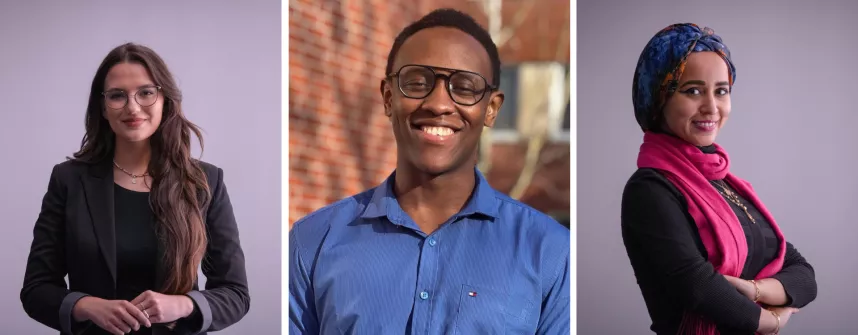The power of collaboration: Using AI to understand the mechanisms of creative thinking
Early research involvement, applicability and employability are core values of the education offered by Constructor University in Bremen. Students are encouraged to look beyond their study programs and engage with experts from other disciplines. Dr. Radwa Khalil and Dr. Mathias Bode recently supervised a thesis project, bringing together neuroscience and computer science to better understand what blocks or fosters processes of creative thinking.
“Collaboration is essential in research, especially in answering increasingly complicated questions that require integrating knowledge from various disciplines and that engage multiple stakeholders,” said Khalil. She recently supervised two students from the School of Computer Science and Engineering, Denisa Checiu and Ronald Mtenga, who were able to apply their knowledge of AI tools on her current research topic as part of their thesis projects. Combining the two fields they were able to significantly contribute to enhancing the understanding of the mechanisms of creative thinking in the human brain. Both theses resulted in pre-print publications.
“I was always fascinated with how Robotics and Neuroscience are interconnected and was thrilled about the opportunity to integrate both in my thesis project. The combination allowed us to take a step forward towards the seemingly impossible goal of replicating the human brain in its full complexity,” Denisa, who recently graduated in Robotics and Intelligent Systems, said.
In the context of Khalil’s creativity research, the team modified a particular type of neural network model by integrating pattern weight control. This pattern gave a solid picture of content addressable memory, comparing search data with stored data. It showed conceptual connections in stored data, a first step toward a more complete framework for creative thinking-based associations. Thus, the researchers were able to make advances in identifying two mechanisms that could aid in network dynamics and the creation of associative linkages. With the help of Artificial Neural Networks (ANNs) it is now possible to simplify the mechanisms of creative thinking and to apply the identified factors that either block or foster it, to inspire and drive innovation in various fields, such as Design Thinking, Marketing, Medicine, Architecture or science communication.
Khalil is convinced that “research and science are ever evolving and originate from an accumulative process that needs to be constantly fed with different types of information from various fields.” Thus, opening the door to interdisciplinary collaboration for students early on in their careers is a mission close to her heart.
Anyone interested in learning more about this topic is welcome to stop by at this year’s Annual Exhibition at the Bremen House of Science where regional scientific and higher education institution present their approach on the theme “In the starting blocks - the next generation of scientists, students and trainees in the state of Bremen”. The exhibit (mostly in German) runs until February 27th, 2024 and is open to the public and free of charge.
Link to publications:
https://www.biorxiv.org/content/10.1101/2023.09.22.559049v1
https://www.biorxiv.org/content/10.1101/2023.09.18.557700v2
Questions answered by:
Radwa Khalil | Neuroscientist
rkhalil@constructor.university | Tel.: +49 421 200-3430
About Constructor University:
Founded in 2001, Constructor University is a top-ranked, English-language, private university, with a campus in Bremen, Germany. With its interdisciplinary approach, advanced digital learning tools and accredited programs, it equips students with fundamental knowledge, critical thinking and practical skills to build their professional career and address the world’s most pressing challenges.
The University emphasizes a synergetic and entrepreneurial spirit, offering program mentoring from top-tier professors and industry experts. Partner collaborations include the Constructor Institute in Schaffhausen, Switzerland, Carnegie Mellon, the National University of Singapore, the University of Geneva, and industry references such as Anisoprint, JetBrains and ChemDiv.
Internationality and diversity lie at the heart of Constructor University, with more than 110 nations at its vibrant and close-knit campus community in Bremen. There, students enjoy active campus life, with access to clubs, professional networks and academic counselling, essential to their personal and academic growth.
Research-centric faculty projects at the University are funded by the German Research Foundation, the European Union's Framework Program for Research and Innovation, and globally leading companies.
The greater Constructor Knowledge ecosystem includes Constructor University in Bremen, Germany, and Constructor Institute in Schaffhausen, Switzerland. It is a provider of education services with education tools, worldwide traditional and online educational services, as well as advisory and strategic services to education customers in the fields of student recruitment, communications, and marketing support.
